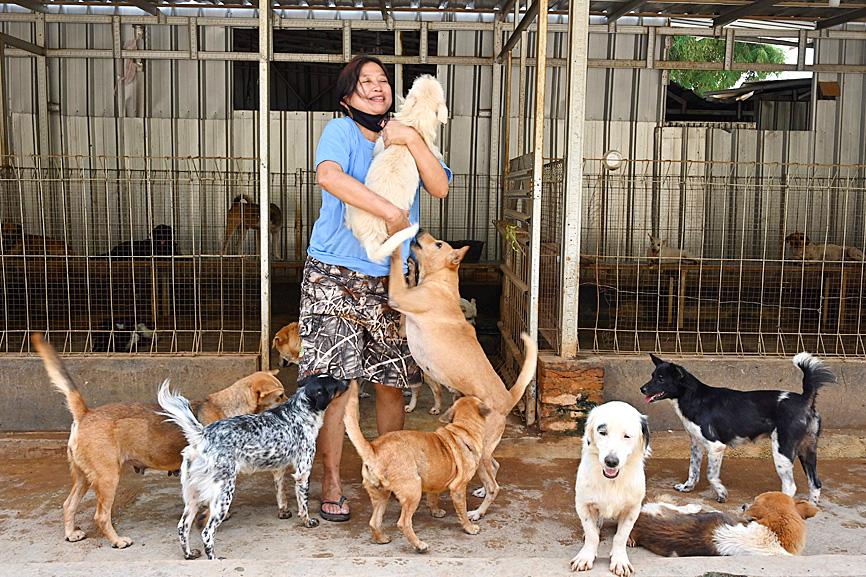Indonesian doctor Susana Somali and her staff cut tightly bound plastic ropes off dozens of whimpering dogs rescued from the butcher’s block after being sold or abandoned during the COVID-19 pandemic.
Somali’s sprawling Jakarta complex, home to about 1,400 canines, has become a refuge for at-risk animals as cash-strapped owners sell them into the Southeast Asian nation’s controversial dog meat trade.
Mostly acting on tips-offs, Somali and her team hit the streets looking for stray dogs and butcher shops where more and more doomed animals are spending their last days howling in cramped cages.

Photo: AFP
Somali — who juggles a day job testing COVID-19 samples at a local hospital — started the shelter in an upscale Jakarta neighborhood more than a decade ago.
Back then, she rescued one or two dogs from a butcher each week. In the past few months, that number has soared to as many as 20, as strays are snatched off the streets for their meat.
The 55-year-old mother of two negotiates with often unfriendly butchers, sometimes paying them cash or supplying other meat to secure the animals’ release.
“The real battle is not rescuing them from butchers, although that is always scary. The challenge is taking care of these dogs during the pandemic,” Somali said.
Somali and about 30 staff at Pejaten Animal Shelter are struggling to care for a huge number of animals as donations plunge amid the pandemic.
The money is crucial to help cover upwards of US$29,000 in monthly expenses, including employee salaries and the daily cost of half a tonne of meat for the animals.
Myriad breeds, including huskies, pit bulls and German shepherds, roam the 5,000m2 shelter.
She started confronting butchers after seeing a video of a pregnant dog about to be slaughtered.
“Someone posted images of this crying dog on social media and I saw the tears in her eyes,” she said.
“That’s when I became aware of the butchers,” she said.
Somali and her team rescued dozens of puppies bound for a local Korean eatery this month, but they do not always make it in time.
“I tried to reach the area but was told that the dog had already been [killed],” she said of one dash to a butcher’s shop.
“It was a minute too late,” she added.
Animal welfare groups estimate that as many as 1 million dogs are killed annually across Indonesia, with more than 100 restaurants in Jakarta alone serving their meat, according to government figures.
Dog is often a culinary specialty among Indonesia’s non-Muslim minority groups.
The animals are considered unclean in Islam and rarely kept as pets in Muslim-majority countries.
Indonesia is relatively relaxed by comparison, but working at the shelter can still be tricky for Muslim volunteers like Ria Rosalina.
“Many people have asked me why I take care of dogs, but also wear hijab,” she said, referring to the religious head-covering worn by many Indonesian women.
“But I don’t care. I just tell them that dogs were created by God, just like humans,” she said.
The plight of Indonesia’s dogs is not limited to the megacity capital.
Animal welfare organization Four Paws has warned that thousands of strays in Bali were at risk of starving or being snatched by dog meat traders, as a plunge in tourism hammers the holiday island.
It is also a growing problem in other parts of Southeast Asia as traders prey on owners facing hard economic times, Four Paws veterinarian Katherine Polak said.
“Animals are at a very heightened risk,” she said.
“Some low-income people might be tempted to sell their pets,” she added.
For years, activists have called on the government to halt Indonesia’s dog meat market — a goal shared by Somali.
“Ending the dog meat trade may sound like a dream but everything starts from a dream. I’ll always keep fighting,” the shelter owner said.

‘IN A DIFFERENT PLACE’: The envoy first visited Shanghai, where he attended a Chinese basketball playoff match, and is to meet top officials in Beijing tomorrow US Secretary of State Antony Blinken yesterday arrived in China on his second visit in a year as the US ramps up pressure on its rival over its support for Russia while also seeking to manage tensions with Beijing. The US diplomat tomorrow is to meet China’s top brass in Beijing, where he is also expected to plead for restraint as Taiwan inaugurates president-elect William Lai (賴清德), and to raise US concerns on Chinese trade practices. However, Blinken is also seeking to stabilize ties, with tensions between the world’s two largest economies easing since his previous visit in June last year. At the

UNSETTLING IMAGES: The scene took place in front of TV crews covering the Trump trial, with a CNN anchor calling it an ‘emotional and unbelievably disturbing moment’ A man who doused himself in an accelerant and set himself on fire outside the courthouse where former US president Donald Trump is on trial has died, police said yesterday. The New York City Police Department (NYPD) said the man was declared dead by staff at an area hospital. The man was in Collect Pond Park at about 1:30pm on Friday when he took out pamphlets espousing conspiracy theories, tossed them around, then doused himself in an accelerant and set himself on fire, officials and witnesses said. A large number of police officers were nearby when it happened. Some officers and bystanders rushed

Beijing is continuing to commit genocide and crimes against humanity against Uyghurs and other Muslim minorities in its western Xinjiang province, U.S. Secretary of State Antony Blinken said in a report published on Monday, ahead of his planned visit to China this week. The State Department’s annual human rights report, which documents abuses recorded all over the world during the previous calendar year, repeated language from previous years on the treatment of Muslims in Xinjiang, but the publication raises the issue ahead of delicate talks, including on the war in Ukraine and global trade, between the top U.S. diplomat and Chinese

RIVER TRAGEDY: Local fishers and residents helped rescue people after the vessel capsized, while motorbike taxis evacuated some of the injured At least 58 people going to a funeral died after their overloaded river boat capsized in the Central African Republic’s (CAR) capital, Bangui, the head of civil protection said on Saturday. “We were able to extract 58 lifeless bodies,” Thomas Djimasse told Radio Guira. “We don’t know the total number of people who are underwater. According to witnesses and videos on social media, the wooden boat was carrying more than 300 people — some standing and others perched on wooden structures — when it sank on the Mpoko River on Friday. The vessel was heading to the funeral of a village chief in